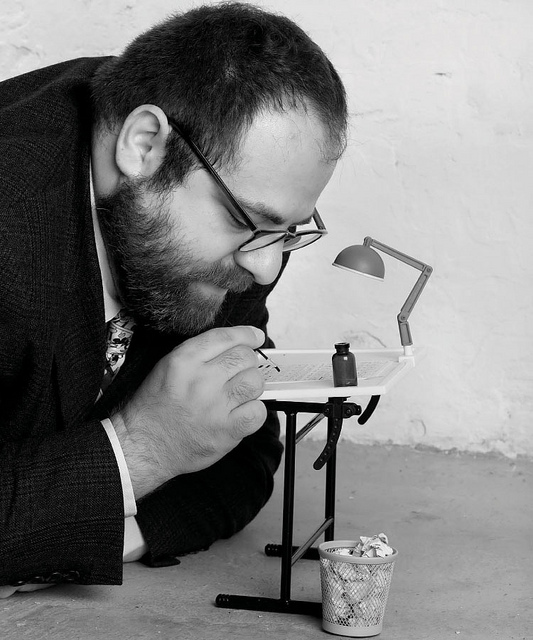 |
| Aesthetics: A Memoir by Ivan Brunetti Yale University Press, 2013 |
Ivan Brunetti's new book, Aesthetics: A Memoir, is, first of all, not a memoir. It's more of a monograph by the subject (an automonograph?) that is decidedly sparse on biographic detail. Essentially a hardcover reprint of a catalog of an exhibition from 2009 plus some new material interspersed with commentary by Brunetti, Aesthetics focuses on his more mainstream material of more recent years rather than his Schizo phase. As a pretty comprehensive collection of his New Yorker material and otherwise uncollected short pieces, Aesthetics is indispensable. His commentary and self-assessments are in-depth (if short) and very effective at illustrating his art process and thought process behind the pieces. And the works presented are far more enjoyable than his Schizo work (for me, anyway).
Aesthetics is not limited to the author's published work. A superbly designed hardcover presentation, the work showcases his wood and papier-mache constructions, and his avowed tendency to doodle obsessively, often the same image hundreds or thousands of times. His unpublished doodles and his constructions are reflective of his more recent, mainstream cartoony style rather than anything remotely like his Schizo work. This is telling. He describes a constant evolution of his style, and while he is critical of both the style and level of output in his more recent work, his evolution to the cleaner cartooning - both in style and content - seems to be representative of his true aesthetic. There are copious photos of his work and living spaces, and his contemporary style seems to fit his internal and external style.
But there is more than a little question of the future. Brunetti describes the mental turmoil that has afflicted him throughout his life and the undeniable and unavoidable effect on his art. And how an increased focus on the nine-to-five of being a teacher has taken him away from the drawing table. He sees illustrating as a muscle that must be flexed constantly lest it atrophy, and he fears his art is beginning to stagnate. (I see his art coming alive, what little he is able to do anyway.) And then there is his eyesight. For years his eyesight has been degenerating and he fears he may not be able to continue cartooning even if he wanted. By his own admission, these factors have played a role in him not producing many (if any) comic or art in the past few years.
Aesthetics: A Memoir is an odd duck of a book. Not quite a memoir, not quite an art book, not quite a monograph, not quite a catalog. It's an appropriately indefinable book for an artist whose distinct career phases defy convention. But the book may actually represent the final piece from one of comics' unique voices, the final testament of a cartoonist continuously on the edge of taste and of the mainstream. I hope it isn't.






























No comments:
Post a Comment